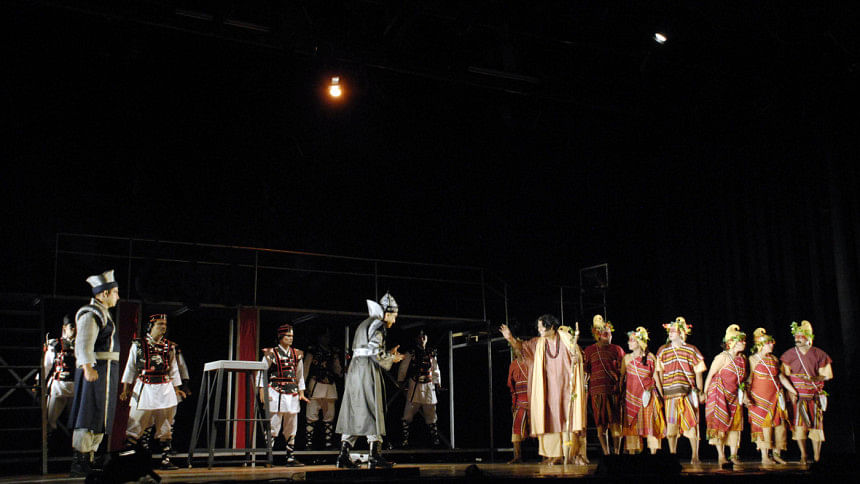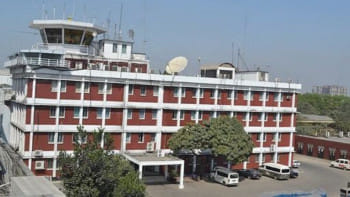How Tagore Exposed the Tyranny of Nationalism

Rabindranath Tagore, whose genius touched nearly every branch of the arts and literature, left an indelible imprint on the world of drama—not merely as a playwright, but as an actor, director, and visionary of the stage. His play Muktadhara, written over a century ago, stands as a luminous critique of self-interest-driven political ideologies. Living under the shadow of colonial rule, Tagore watched as the rise of machinery and technology reshaped the dreams and follies of both empire and nation. Strikingly, he not only foresaw the wounds humanity would inflict upon the climate, but also prophesied the devastating force of blind nationalism against the natural world. Historian Edward Thompson hailed Muktadhara as Tagore's finest prose drama, while Marjorie Sykes admired its rare, unflinching power in expressing his political vision.

The Story of Muktadhara
Muktadhara tells the story of King Ranjit of Uttarkut, who, through the tireless efforts of the royal engineer Bibhuti over twenty-five years, constructed the mighty Muktadhara Dam, making the neighbouring region of Shibtarai dependent on Uttarkut for its water supply. Uttarkut sits in the upper basin of the Muktadhara spring's mountainous source, while Shibtarai lies below. When a new water crisis strikes and famine looms, the people of Shibtarai, led by the ascetic Dhananjay Bairagi, launch a satyagraha by refusing to pay taxes. Crown Prince Abhijit is dispatched to suppress the movement, but instead he is moved by the suffering of the people. When he reports this to the king, he is replaced by the king's oppressive brother-in-law, newly appointed governor.
Abhijit later learns from his uncle that he is not of royal blood but was found and raised by the king, born near the very spring of Muktadhara. When ordered to use the dam as a weapon against Shibtarai, Abhijit refuses and pleads with Bibhuti to dismantle it. Yet Bibhuti, blinded by pride, refuses. In an act of defiance, Abhijit opens the passage, is imprisoned, and is branded a traitor. In the end, he releases the waters—and is carried away with them.
How Muktadhara Was Written and Performed
Between May 1920 and July 1921, Rabindranath Tagore travelled extensively across Europe and the United States in the aftermath of World War I. Earlier, in 1916, he had visited Japan and America, where he delivered his famous lectures on nationalism, warning of the dangers of narrow national pride and its potential to devastate both societies and nature. Meanwhile, back home in Bengal, the Non-Cooperation Movement was gaining momentum. Although Tagore remained politically engaged—often reflecting on events in his letters—his creative output slowed as he focused on his educational project, Visva-Bharati.
It was during a brief stay at Selaidaha in Kushtia in late December 1921 that Tagore composed Muktadhara. After completing the play, he returned to Visva-Bharati, read it to the ashram community, made revisions, and initially considered naming it Path or Street. Eventually, it was published as Muktadhara. In February, he read it again at Gaganendranath Tagore's home in Calcutta. There, Tagore emphasised, "This play should not be taken as an allegory. The movement that has deeply permeated the country today is not represented through metaphor… What has been especially portrayed is that clearing the path, opening the way for human unity, is the ultimate message of all civilisation."
Biographer Prasanta Kumar Pal notes that Muktadhara was first published in Prabasi in Baishakh 1329 (1922), then as a standalone book later that year, funded by Prabasi editor Ramananda Chattopadhyay, who donated 3,731 copies to Visva-Bharati. Hoping to reach European audiences, Tagore translated the play as The Waterfall, published in The Modern Review in May 1922. Its critique of mechanisation likely resonated more with European readers, who were already grappling with industrialisation's effects, than with Indian audiences.
However, as Abhijit Sen noted, The Waterfall received less attention than Red Oleanders, Tagore's English version of Raktakarabi(1924). Surprisingly, Tagore never saw Muktadhara or Raktakarabi staged during his lifetime. He had woven 14 songs into Muktadhara, blending music and dialogue seamlessly.
Initially, Muktadhara received a lukewarm response. Though Tagore wrote to Ranu Adhikari about staging it, time constraints prevented this. It was first performed four years later by Presidency College students. In 1959, Bohurupee staged it under Shambhu Mitra, but it failed to connect. A 1996 revival by Kumar Roy and performances near the Farakka Barrage gave the play new life, especially among Narmada Bachao Andolan activists. In Bangladesh, Muktadhara remains part of Tagore's enduring dramatic legacy.

Dialogues in Muktadhara
Drama is a concentrated effort to unite actors and audience by crafting a shared ambience—through stage design, lighting, meaningful dialogue, and the director's vision. Among these, it is primarily dialogue that generates tension, nuance, and layered meaning for the audience. In Muktadhara, a striking example occurs when a teacher presents his students to the king during the public celebration of the dam. The scene offers a revealing glimpse into how ideology is transmitted—even to the youngest citizens—under the guise of education. The king engages the students in conversation, probing how deeply they have internalised the prevailing political rhetoric.
King: They all know, I suppose, what Bibhuti has done?
Students (jumping and clapping their hands): Yes, yes! He has stopped Shivtarai's drinking water!
King: And why did he do that?
Students: To make them smart!
King: And why should he make them smart?
Students: Because they are bad men.
King: How bad?
Students: Everybody knows it—they are very bad, awfully bad!
King: But do you know why they are bad?
Teacher: Of course they know, Maharaja. Now, you—didn't you read it? Didn't you read it in your book?
(whispers) Their religion is very bad.
Students: Yes, yes! Their religion is very bad.
Teacher: And besides, they're not like us. Come now, speak up! (He points to his nose.)
Students: They haven't got high-ridged noses!
Teacher: Right. And what has our professor taught us? What does a high-ridged nose mean?
Students: The greatness of our race!
This scene, with its satirical intensity, exposes how prejudice, hatred, and racial superiority are embedded into the minds of children through manipulated education—something Rabindranath critiques with biting clarity.
Bibhuti, who spent 25 years building the dam, saw it as a triumph of human intelligence over nature: "The gods gave them water. To me, they gave power. My dam was meant to prove intelligence, not to save a farmer's maize crop."
King Ranajit of Uttarakut faced criticism from his uncle, King Visvajit of Mohangarh, who questioned the dam's purpose and the worship of Bhairava, especially dedicating a day to celebrate a machine that blocked a sacred spring. Bhairava, after all, is also Shivtarai's deity.
Ranajit replied fiercely: "To conquer our enemies. Bhairava is ours—our victories are His. He reclaims his gift by piercing Shivtarai and offering it to Uttarakut."
Visvajit shot back: "That's not worship—it's payment."
The most suspenseful event in the drama is the revelation that Abhijit is not the king's true son. Learning of his birth by the Muktadhara falls, this discovery shapes his final mission: to release the spring and clear the path.
Ranajit's temper flared when he suspected that it was Visvajit who had revealed to Abhijit the truth about his origins—that he had been found beneath the falls of Muktadhara. Visvajit admitted as much and recounted a striking moment: "I saw him (Abhijit) standing on the terrace, gazing towards Gouri's Peak. 'What do you see, brother?' I asked. 'I see roads,' he said, 'roads not yet built—roads of the future that cross those forbidding passes, roads that will bring the distant near.' As I listened, I thought: 'Some vagrant mother bore him by the springs of Muktadhara, and who can keep him bound?' I could no longer keep silent. I said, 'Brother, from the moment of your birth, the Lord of the Hills welcomed you to the road. No conch-shell called you within doors.'"
Ranajit now understood why Abhijit's loyalty had drifted from the royal house of Uttarakut. Abhijit had openly demonstrated his alienation by reopening the Nandi Pass—a route that, once cleared, connected both Uttarakut and Shivtarai. But this very path to unity had been forcefully closed again with the construction of the dam.
Enraged by what he saw as defiance and betrayal, Ranajit ordered King Visvajit to leave Uttarakut forever. In a symbolic reversal of allegiance and control, he exiled Visvajit and incarcerated Abhijit—for daring to reopen the Nandi Pass to save the Shivtarai people from continual famine.
In response to the injustice imposed by Uttarakut, the people of Shivtarai express their resentment—revealing not just resistance but also deep-seated stereotypes and disdain. Their conversation reflects how prejudice and misperception were embedded in the everyday discourse of common people, mirroring the same kind of hatred.
First Shiv: What strange faces these Uttarakut fellows have! It's as if the Creator began shaping a lump of flesh but never finished the job.
Second Shiv: And those absurdly tight clothes—have you ever seen anything like it?
Third Shiv: They've wrapped themselves up like packages, afraid a piece of themselves might fall off.
First Shiv: They're born to drudgery—always loitering around markets and ferries.
Second Shiv: No culture at all. Their so-called scriptures—what even is in them?
First Shiv: Nothing! Absolutely nothing. And did you see their writing? Like a trail of white ants.
Second Shiv: Exactly! White ants—they gnaw everything to pieces with their so-called 'culture.'
Third Shiv: And then bury it all under their mounds.
First Shiv: Yes—killing our bodies with their weapons, and our minds with their books.
Second Shiv: They are steeped in sin. Our guru says even crossing their shadow is a pollution.
This dialogue powerfully illustrates how mutual hatred—fuelled by distorted beliefs, cultural superiority, and predisposition—pervades both sides. Rabindranath highlights how deeply these divisions are entrenched, affecting not only the common people but also institutional thinking, from everyday life to classroom instruction.
Characters in Muktadhara
Critics have observed that the identity of Uttarakut is revealed through the tension between Bibhuti and Abhijit. While Bibhuti embodies the mechanical mind—the triumph of machines—Abhijit represents the human spirit that resists dehumanisation, merging the poet's soul with the rebel's courage. His rebellion is tragic because it is life itself, not just another lifeless force, that rises against the machinery of domination. As Pramath Nath Bishi noted, Bibhuti and Abhijit represent two realms—the mechanical and the post-mechanical—that together form Uttarakut's full identity. They are not opposites but complements, bound in relation.
Similarly, the soul of Shivtarai emerges through the interplay between Dhananjay Bairagi and the suffering masses—the "beaten ones." Dhananjay's duality shows in his call to resist violence with non-violence, while his human vulnerability responds with grief or anger. Just as Uttarakut fails to grasp Abhijit's message, Shivtarai cannot absorb Dhananjay's deeper moral vision. While Uttarakut rallies around nationalism, Shivtarai places blind faith in a heroic saviour.
The relationship between King Ranajit and Abhijit also carries tragic weight, reminiscent of Creon and Antigone. Ranajit, bound by duty, cannot understand Abhijit and ultimately imprisons him—turning the rebel's death into both a political and deeply personal tragedy.

Ekla Cholo Re?
The dam not only made life in Shivtarai unbearable by blocking the natural flow of the spring, but it also cost the lives of many people from Uttarakut who were forced into labour to realise this grand vision. Every boy aged eighteen and above was seized to serve as part of the workforce behind this boastful monument, built to assert dominance over Shivtarai.
One of the most haunting figures in the drama is Sumon's mother, who appears repeatedly, seemingly losing her mental stability as she searches for her missing son—taken away for the dam's construction and never heard from again. Yet Bibhuti remains unmoved, declaring, "Their lives were not given in vain, and my dam is completed." They become martyrs to their own progress—what we might now call martyrs for development. However, from the king to the common people, the lives of many like Sumon were ultimately regarded as expendable in the name of Uttarakut's national interest.
In Muktadhara, two distinct collective dispositions emerge. On one side, the people of Uttarakut turn vehemently against Prince Abhijit for opening the Nandi Pass, denouncing him as a traitor to the state. Their anger is so consuming that they demand to seize him from royal custody and subject him to an immediate trial—bypassing both legal procedure and the authority of the king, whom they suspect may pardon him out of paternal affection.
On the other side, the people of Shivtarai are driven by a singular desire for revenge. They place blind faith in Dhananjay, their chosen leader, expecting him to deliver immediate relief from their suffering. This mirrors a familiar pattern: the uncritical worship of a messianic figure and total submission, which Dhananjay himself detests. Both groups, in their own ways, reveal how collective passion can overshadow justice, reason, and self-awareness.
Amid this frenzy, only one woman dares to speak the truth: that the prince committed no crime by opening the pass.
After 100 Years of Muktadhara
Rabindranath engaged deeply with the realities of both the colonised world and the so-called free nations of Europe, America, and Japan. Born and raised in the cosmopolitan city of Calcutta, he also spent extended periods in the rural heartlands of East Bengal. This dual exposure shaped his critical insight and sensitivity to the profound social, environmental, and ecological changes unfolding around him. In his travelogue Japan Jatri, based on his first visit to Japan in 1916, he wrote in his letters:
The cities in this world that are truly alive have been built through human compassion. Be it Delhi, Agra, or Kashi—human joy has brought them into being. But the goddess of commerce is ruthless; beneath her feet, the lotus of beauty in the human mind-lake does not bloom. She does not look towards people—she desires only commodities; the machine is her vehicle.
When our ship was coming down the Ganges, we saw the shameless cruelty of commercial wealth along both banks of the river. It is because she holds no affection in her heart that she has been able to so easily destroy the beautiful riverside of Bengal's Ganges.
Notably, in the play Muktadhara, we see the other side of the coin to the destruction of the environment and the river—driven by the interests of a particular nation seeking to subjugate others by asserting supremacy through geographical positioning, aided by scientific knowledge and technology. This stands in contrast to the focus on commerce that Tagore reflected on in Japan Jatri.
Beyond the crisis of nationalistic ideas, the contemporary debate between Rabindranath and Gandhi over machines and technology becomes crucial—and even more relevant in today's world. The shadow of this debate is prominently reflected in the play. While Gandhi viewed the machine as inherently problematic, ultimately seeing it as a source of tyranny over both humans and nature, his position leaned towards the eradication of machines altogether.
Rabindranath, on the other hand, believed that science and technology should not be rejected irrationally. He acknowledged their dangers but maintained that their impact depended on the rationality and ethics with which humans employed them. However, in today's world, the line between rational and irrational use has become increasingly blurred.
As Ashis Nandy observed, "Patriotism is sentimental; nationalism is an ideology," and Rabindranath composed over 200 poems imbued with the spirit of patriotism, consistently rejecting the ideological rigidity of nationalism—a stance that also finds powerful expression in his symbolic drama Muktadhara.
Priyam Pritim Paul is a researcher and journalist.

 For all latest news, follow The Daily Star's Google News channel.
For all latest news, follow The Daily Star's Google News channel. 








Comments